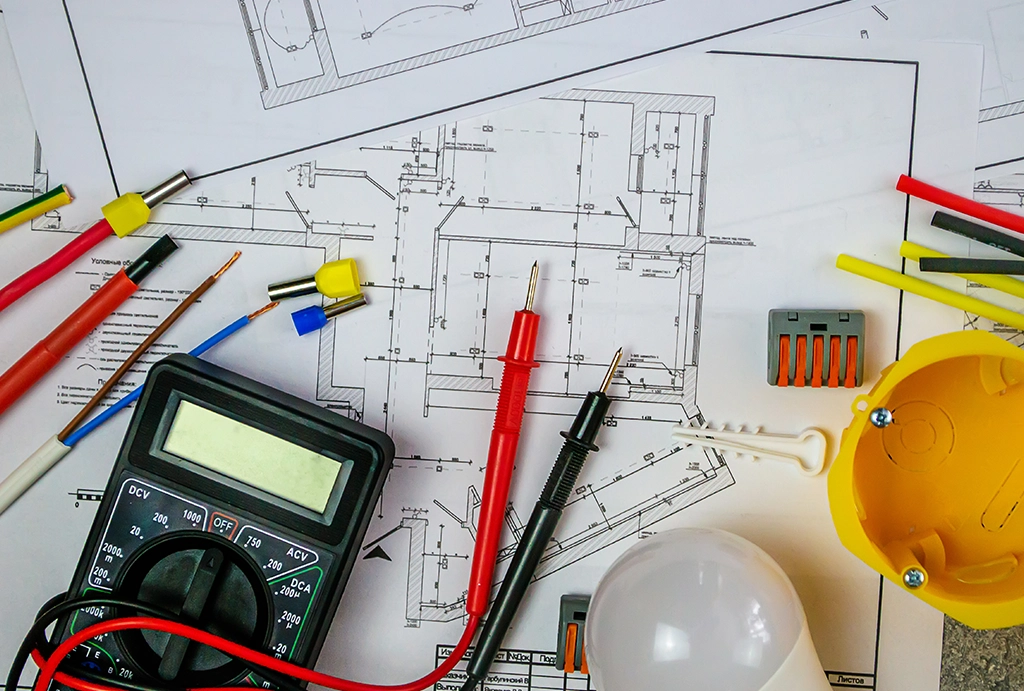A diploma in electrical engineering offers a pathway into a demanding electrical systems and technology field with various opportunities. It ranks among the top career-focused diploma courses in India 2025 due to its excellent placement prospects, industry relevance, and the growing demand for electrical engineers across multiple sectors.
This 3-year undergraduate course equips students with practical and theoretical skills and opens doors to various opportunities and possibilities.
What is a Diploma in Electrical Engineering?
A diploma in Electrical Engineering is a three-year undergraduate course that teaches students to apply electromagnetics, electricity, and electronics. Using various tools, this course imparts the skills required for analyzing, designing, and troubleshooting electrical systems.
Students who complete a diploma in electrical engineering can launch their careers early with a base salary of INR 2.4-4.30 lacs, making it one of the high-paying courses after 12th for science students.
The technical skills gained provide strong foundation for both immediate employment and further education through lateral entry into engineering degrees.
Subjects in Diploma in Electrical Engineering
The program encompasses a range of subjects that build a solid foundation in electrical engineering:
- Electrical Circuits and Machines: Study of electrical components and machinery.
- Electronics Devices and Circuits: Understanding semiconductor devices and circuit designs.
- Digital Electronics: Introduction to digital systems and binary logic.
- Control Systems: Principles of automation and control in electrical systems.
- Power Systems: Exploration of electrical power generation, transmission, and distribution.
- Electrical Drawing and CAD: Technical drawing skills and computer-aided design.
- Microprocessor and Microcontroller Applications: Programming and applications of microprocessors.
- Renewable Energy Sources: Study of alternative energy and sustainable practices.
Eligibility Criteria for Diploma in Electrical Engineering After 12th
To enroll in a Diploma in Electrical Engineering after 12th, candidates typically need to meet the following criteria:
- Educational Qualification: Completion of 10th grade (SSC) or 12th grade (HSC) with a focus on science subjects (Physics, Chemistry, and Mathematics).
- Minimum Marks: A minimum aggregate score of 45-50% in qualifying examinations, though this may vary by institution.
- Entrance Examinations: Some institutions may require candidates to pass entrance exams specific to engineering diplomas.
Best Colleges for a Diploma in Electrical Engineering
Selecting a reputable institution is crucial for quality education and career prospects. Here are some esteemed colleges offering a Diploma in Electrical Engineering:
- Dr. T. Thimmaiah Institute of Technology, Karnataka: Known for its robust engineering programs and state-of-the-art facilities.
- Navodaya Institute of Technology, Karnataka: This institution offers comprehensive technical education focusing on practical skills.
- Sigma University, Gujarat: The university provides diverse engineering courses with modern infrastructure and experienced faculty.
Career Scope After Electrical Diploma
Graduates with a Diploma in Electrical Engineering have a wide array of career opportunities:
- Electrical Engineer: Designs and maintains electrical systems.
- Maintenance Engineer: Ensuring the operational efficiency of electrical equipment.
- Electrical Design Engineer: Developed electrical layouts and schematics.
- Project Engineer: Oversees electrical projects from conception to completion.
- Technical Supervisor: Managed technical teams and ensured compliance with standards.
Job Roles and Salary Expectations
The salary for diploma holders varies based on experience, location, and industry.
- Entry-Level Positions: Approximately ₹2.5 to ₹3.5 lakhs per annum.
- Mid-Level Positions: ₹4 to ₹ 6 lakhs per annum with 3-5 years of experience.
- Senior Positions: ₹6 to ₹10 lakhs per annum for roles like project manager or senior engineer.
Industries Hiring Electrical Diploma Graduates
Several sectors actively seek electrical diploma graduates: Manufacturing, Construction, Automotive, Power Generation and Distribution, and Telecommunications.
Similar diverse industry opportunities exist for chemical engineering graduates who work across petrochemicals, pharmaceuticals, food processing, and renewable energy sectors with excellent scope and career growth.
- Manufacturing: The Production and maintenance of electrical equipment.
- Construction: Electrical installations in residential and commercial projects.
- Automotive: Electrical systems in vehicles.
- Power Generation and Distribution: Managing electrical grids and power plants.
- Telecommunications: Maintaining communication networks and equipment.
Further Study Options: After the Electrical Diploma Courses
Diploma holders can enhance their qualifications through:
- Bachelor of Engineering (B.E.) or Bachelor of Technology (B.Tech): Lateral entry into the second year of these programs.
- Advanced Diplomas or Certifications: Specializations in PLC programming, industrial automation, or renewable energy.
Certificate & Specialization Courses in Electrical Engineering
Short-term courses can provide specialized skills:
- PLC and SCADA Systems: Automation and control systems.
- Electrical CAD: Designing electrical layouts using CAD software.
- Renewable Energy Systems: Focus on solar, wind, and other sustainable energy sources.
- Industrial Safety: Ensuring safety standards in electrical engineering practices.
Is a Diploma in Electrical Engineering Worth It?
Electrical engineering is one of the most popular branches of electrical engineering and has tremendous scope. You can decide whether to join the job market after obtaining a Diploma in Electrical Engineering or continue your education to further upgrade your skills and knowledge.
Either way, you can have a bright career in the field. Look for colleges that have focused on skill development and training opportunities. This will help you stand out from the crowd in the job market.
Contact us today for personalized guidance and more information on pursuing a Diploma in Electrical Engineering.
FAQs
1. What are the career options after a diploma in electrical engineering?
A diploma in electrical engineering opens doors to various job roles across industries. Some popular career options include:
- Electrical Engineer – Designs and maintains electrical systems.
- Maintenance Engineer – Ensuring the efficiency of electrical equipment.
- Electrical Design Engineer – Developed layouts and schematics for electrical projects.
- Project Engineer – Managed electrical projects from start to finish.
- Technical Supervisor – Leading and ensuring safety compliance.
- Power Plant Operator – Managing power distribution in plants.
- Automation Engineer – Worked with industrial automation and control systems.
2. Which are the best colleges for a diploma in electrical and electronics engineering?
Some of the top colleges offering a Diploma in Electrical & Electronics Engineering include:
- Sigma University, Gujarat – Offers a well-structured diploma program with practical training.
- Government Polytechnic Colleges (India-wide) – Known for affordable and high-quality technical education.
- Dr. T. Thimmaiah Institute of Technology, Karnataka specializes in electrical and electronics programs.
- Navodaya Institute of Technology, Karnataka offers advanced technical training with modern infrastructure.
3. What are the subjects of a diploma in electrical engineering?
The diploma in electrical engineering syllabus covers the following:
Core Subjects:
- Electrical Circuits and Machines
- Electronics Devices and Circuits
- Digital Electronics
- Power Systems
- Control Systems
- Microprocessor & Microcontroller Applications
Practical and Technical Training:
- Electrical Drawing and CAD
- Industrial Automation
- Renewable Energy Sources
4. What is the average salary after completing a diploma in electrical engineering?
Salary depends on factors like job role, experience, and location. On average:
- Entry-Level Jobs: ₹2.5 to ₹3.5 lakh per annum
- Mid-Level Jobs (3-5 years experience): ₹4 to ₹6 lakh per annum
- Senior-Level Jobs (5+ years experience): ₹6 to ₹10 lakh per annum
5. What are the best short-term courses after an electrician diploma?
For skill enhancement, diploma holders can pursue:
- PLC and SCADA Programming – For automation and industrial control systems.
- Electrical CAD – Designing electrical layouts using CAD software.
- Renewable Energy Systems – Focus on solar, wind, and sustainable power.
- Industrial Safety & Electrical Maintenance – Ensuring safety in electrical installations.
- Advanced Power System Training – This is for specialization in power grid management.


